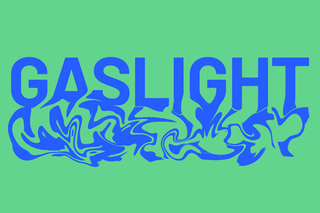
Words Mean Things: ‘Gaslight’
‘Gaslight’ serves a critical purpose — it reinstates reality back to survivors of it. Diluting it takes that away.

In Words Mean Things, we unpack weighty words whose meanings have been sacrificed to hot takes.
To gaslight someone has a meaning. But what is it? See if you can glean it from this tweet, made amid the Twitter controversies this week and in response to a take that the app wasn’t shutting down: “Gaslighting the app into not shutting down is certainly a tactic lmao.”
It’s a word that’s reached a point of ubiquity: anything, anyone, and anywhere can both gaslight and be gaslit, and it no longer has a specific meaning. You can gaslight a stranger online. Anyone indelicately phrasing disagreement could be gaslighting you. You can even gaslight yourself. The possibilities are limitless: the word gaslight itself can gaslight us into thinking it means something else.
The term came from a 1938 play called Gaslight — about an abusive marriage in which the husband flickers the gaslights in the house and denies doing so in order to drive his wife to madness. Since then, it’s become a word to describe intimate partner abuse — or just abuse of any kind — in which one person denies tangible facts of reality to another in order to make them question their own perception and sanity.
Gaslighting, then, is dark and twisted; its meaning performing a specific function. It describes a form of abuse that previously had no name because it was designed to not ever be made sense of. The minds of survivors of gaslighting are “hijacked” by someone else — unable to grasp or interpret their own reality. A name for the phenomenon then brings them back in control — making it a tactic that’s far more damaging than just manipulation.
There’s also an institutional component to gaslighting: it works because nobody else believes the survivor. In the context of the original play, where the phenomenon was first given a name, the husband’s plot was to institutionalize his wife for her money. At the time (Victorian era England), madness was intimately related to women, and it was very easy to commit women to asylums. Often, this was against their will — when others deemed them to be “mad.” But gaslighting is much more insidious for how it turns an individual against themselves, making them willing participants in the theater of false reality constructed by a manipulator.
This made the term trickle into academic and formal usage — especially in the field of psychology. “It is also popularly believed to be possible to ‘gaslight’ a perfectly healthy person into psychosis by interpreting his own behavior to him as symptomatic of serious mental illness,” wrote a Canadian psychologist in a 1962 essay.
Related on The Swaddle:
How ‘Political Gaslighting’ Undermines the Truth
Moreover, it’s still a gendered phenomenon with traces of the Victorian era still prevalent: it works as a tactic because of the prevailing cultural association between femininity and irrationality. “Gaslighting should be understood as rooted in social inequalities, including gender, and executed in power-laden intimate relationships. The theory developed here argues that gaslighting is consequential when perpetrators mobilize gender-based stereotypes and structural and institutional inequalities against victims to manipulate their realities,” notes one paper on the subject.
The definition of what gaslighting entails has since expanded to include undermining emotional responses. “You’re overreacting, You’re being too sensitive, and I’m sorry you feel that way,” are all phrases that…, according to Tracy Conner, a sociolinguistics professor. Emotional responses, according to Conner, can wreak as much damage as physiological ones — evolutionarily, they’ve signaled danger too.
“More than that, they trespass on our sense of identity. The more we hear such phrases, the more we stop trusting ourselves,” writes Ramani Durvasula, about how gaslighting someone means someone else becomes the “gatekeeper to our reality.” It’s now become a very important term to describe emotional or psychological abuse within relationships. Giving it a name based on a reference is important because of how it reinstates reality back into the situation — allowing the survivor to zoom out and regain their footing in reality.
A rule of thumb when it comes to correctly identify gaslighting and reclaim its meaning, then, is to take stock of the power dynamic. If a person is in a position of perceived power and is manipulating another’s reality, they’re most likely gaslighting them — whether they intend to or not.
The resurgence of the word happened during the #MeToo movement, to describe the process of survivors coming out in public to a culture of disbelief and discrediting. It speaks, once again, to an institutional component: gaslighting, by its original meaning, cannot exist in a vacuum, and it requires structures of power to work. Some feminists call it testimonial injustice for how it’s premised on the undermining of credibility based on pre-existing prejudice. This was the experience of #MeToo survivors — whose testimonies, by virtue of them being women, were automatically undermined throughout their lives.
Related on The Swaddle
Many Indian Families Express Care Through ‘Bullying,’ Creating Patterns of Abuse
Clearly, there’s a lot to the word that makes it important and substantive — it not only gives meaning to damaging experiences, it could also save lives for how it implies a common experience that is identifiable and, importantly, escapable. “There’s a whole set of neologisms, or existing terms pressed into unfamiliar use, that exist to turn annoyances into harm or peril. Sealioning, gaslighting, microaggressions, abuse,” wrote Sam Kriss in Damage Magazine. Take, for example, how a contestant on The Bachelorette used the word to describe what another contestant did to her, defining it as “when someone makes you feel it’s your fault.”
“Gaslighting is often used in an accusatory way when somebody may just be insistent on something, or somebody may be trying to influence you,” said Robin Stern, author of The Gaslight Effect.
Using it incorrectly “can lead to the downplaying of people’s actual lived experiences, and these words almost evolve into slang,” Alisa Stamps, author of The Gaslighting Recovery Journal, told Well and Good.
“Gaslight is, like, one of the most overused words ever… it doesn’t mean anything other than the fact that, like, you read the internet. Or, like, ‘Congrats, you have a Twitter account,'” says the character David, in Bodies Bodies Bodies. And he’s not wrong — but he should be.
Misusing the word, then, isn’t just annoying — it can have real consequences on survivors. In a way, using the word in contexts where it doesn’t make sense is itself a form of mass gaslighting — meaning there’s once again no singular word to describe an experience, and the world is once again left wondering what words mean anymore.
Rohitha Naraharisetty is a Senior Associate Editor at The Swaddle. She writes about the intersection of gender, caste, social movements, and pop culture. She can be found on Instagram at @rohitha_97 or on Twitter at @romimacaronii.
Related


The Buzz Cut: Man Who Witnessed Laborious Birth Lauded for Immediately Hitting the Gym
